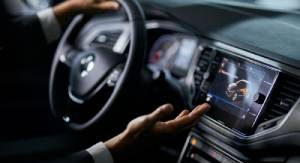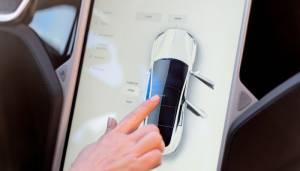The automotive industry is undergoing significant changes during the last few years. Driven by innovation and a commitment to sustainability, the industry is adapting to new technologies and shifting consumer preferences. This article discusses the latest motor trends and innovations, focusing on electric vehicles (EVs), autonomous driving technology, connectivity, sustainability, motor TV show and smart manufacturing.
The Rise of Electric Vehicles (EVs)
Electrification of the Automotive Landscape

Electric vehicles are becoming more popular and accessible. This increase is fueled by government incentives, advancements in battery technology, and a growing focus on reducing carbon emissions. Major car manufacturers, including Tesla, Ford, and Volkswagen, are expanding their electric vehicle offerings. This means consumers have more choices, from compact cars to SUVs.

Advancements in Battery Technology
Battery technology plays a crucial role in the growth of electric vehicles. Solid-state batteries, for instance, offer higher energy density and faster charging times compared to traditional lithium-ion batteries. Companies like QuantumScape and Toyota are at the forefront of this innovation. Their work could help reduce range anxiety, allowing electric vehicle owners to travel longer distances without worrying about running out of charge.

Charging Infrastructure Development
As the number of electric vehicles increases, the demand for charging infrastructure also rises. Significant investments are being made in expanding charging networks. This includes fast charging stations and home charging solutions. Companies like ChargePoint and EVgo are working to ensure that electric vehicle owners have convenient access to charging options. This effort encourages more consumers to consider electric vehicles as a viable option for their transportation needs.
Autonomous Driving Technology
The Road to Full Autonomy
Autonomous driving technology is advancing rapidly. While fully self-driving cars are still undergoing testing, companies like Waymo and Tesla are making progress in deploying advanced driver-assistance systems (ADAS). These technologies aim to improve road safety and efficiency. As these systems become more sophisticated, they pave the way for a future where self-driving cars could become commonplace.
Safety and Regulation Challenges
Despite the excitement surrounding autonomous vehicles, challenges remain. One of the biggest concerns is safety. Governments worldwide are grappling with how to regulate self-driving cars while ensuring public safety. Discussions continue regarding liability, insurance, and ethical considerations surrounding autonomous vehicles. These discussions will influence how quickly and effectively autonomous driving technology is adopted on public roads.
Connectivity and Smart Features
The Connected Car Revolution

As vehicles become more connected, the integration of smart technologies is changing the driving experience. In the near future, cars will be equipped with advanced infotainment systems, real-time navigation, and vehicle-to-everything (V2X) communication. This connectivity enhances safety, convenience, and entertainment for drivers and passengers. For instance, V2X technology allows vehicles to communicate with each other and with infrastructure, improving traffic flow and reducing accidents.
Over-the-Air Updates

One of the most significant innovations in the automotive sector is the ability to perform over-the-air (OTA) software updates. Automakers like Tesla are leading the way by enabling customers to receive new features, improvements, and bug fixes remotely This innovation not only enhances vehicle performance but also extends the lifespan of a vehicle’s technology. As a result, owners can enjoy the latest features without needing to visit a dealership.
Sustainability in the Automotive Industry
A Shift Towards Sustainable Materials
Sustainability is becoming essential for the automotive industry. Manufacturers are increasingly focused on using sustainable materials in vehicle production. This includes the use of bio-based plastics recycled metals, and vegan leather. These materials help reduce the environmental impact of vehicle manufacturing while appealing to eco-conscious consumers.
Circular Economy Practices
The concept of a circular economy is gaining traction in the automotive sector. More companies are adopting practices that emphasize reusing and recycling materials Initiatives such as take-back programs for old vehicles and the use of recycled components in new cars are becoming more common. These practices promote sustainability and help reduce waste in the industry.
Smart Manufacturing and Industry 4.0
Automation and Robotics
The automotive manufacturing process is undergoing a transformation due to automation and robotics. Factories are increasingly utilizing advanced robotics and artificial intelligence (AI) to improve production processes This shift enhances efficiency and reduces labour costs while maintaining high-quality standards in vehicle production.
3D Printing in Automotive Design
3D printing technology is making significant strides in automotive design and manufacturing. Automakers are leveraging additive manufacturing to create prototypes, custom parts, and even entire vehicle components This innovation reduces production time and costs while allowing for greater design flexibility. By using 3D printing, manufacturers can quickly adapt to changing consumer demands and create unique vehicle features.
Consumer Trends Shaping the Future of Mobility
Shifting Consumer Preferences
Consumer preferences are evolving, with a growing emphasis on sustainability, technology, and convenience. Younger generations are increasingly prioritizing eco-friendly transportation options, leading automakers to innovate in areas like electric vehicles and alternative fuels. Additionally, the demand for shared mobility solutions, such as ride-sharing and subscription services, is on the rise as consumers seek flexible transportation options.
The Experience Economy
The automotive industry is responding to the trend of the experience economy, where consumers value experiences over possessions. Car makers are focusing on enhancing the overall customer experience, from seamless purchasing processes to personalized in-car services. This shift is reshaping how vehicles are marketed and sold, with an emphasis on creating memorable experiences for consumers.
The Future of Mobility
Integration of Technologies
The integration of various technologies will define the future of mobility. The automotive industry is increasingly looking at how different innovations can work together to create a seamless driving experience. For example, combining electric vehicle technology with autonomous driving and smart connectivity can lead to more efficient and sustainable transportation solutions. This integrated approach can help reduce traffic congestion and improve air quality.
Urban Mobility Solutions
As cities grow and traffic congestion increases, urban mobility solutions are becoming more important. In recent years, some of the automakers are exploring partnerships with tech companies and local governments to develop innovative solutions for urban transportation. This includes electric buses, e-scooters, and shared mobility services that aim to reduce reliance on personal vehicles. By working together, the industry can create more efficient and sustainable transportation options for urban residents.
Conclusion
As the automotive industry moves through very fast in the last year, it is experiencing significant changes driven by innovation and a focus on sustainability. From the rise of electric vehicles and advancements in autonomous driving technology to the integration of connectivity and smart manufacturing practices, the future of mobility is full of potential. By embracing these motor trends and innovations, the automotive sector is set to create a more sustainable, efficient, and enjoyable driving experience for consumers around the world. The journey ahead promises to redefine how people think about and engage with transportation in their daily lives.

